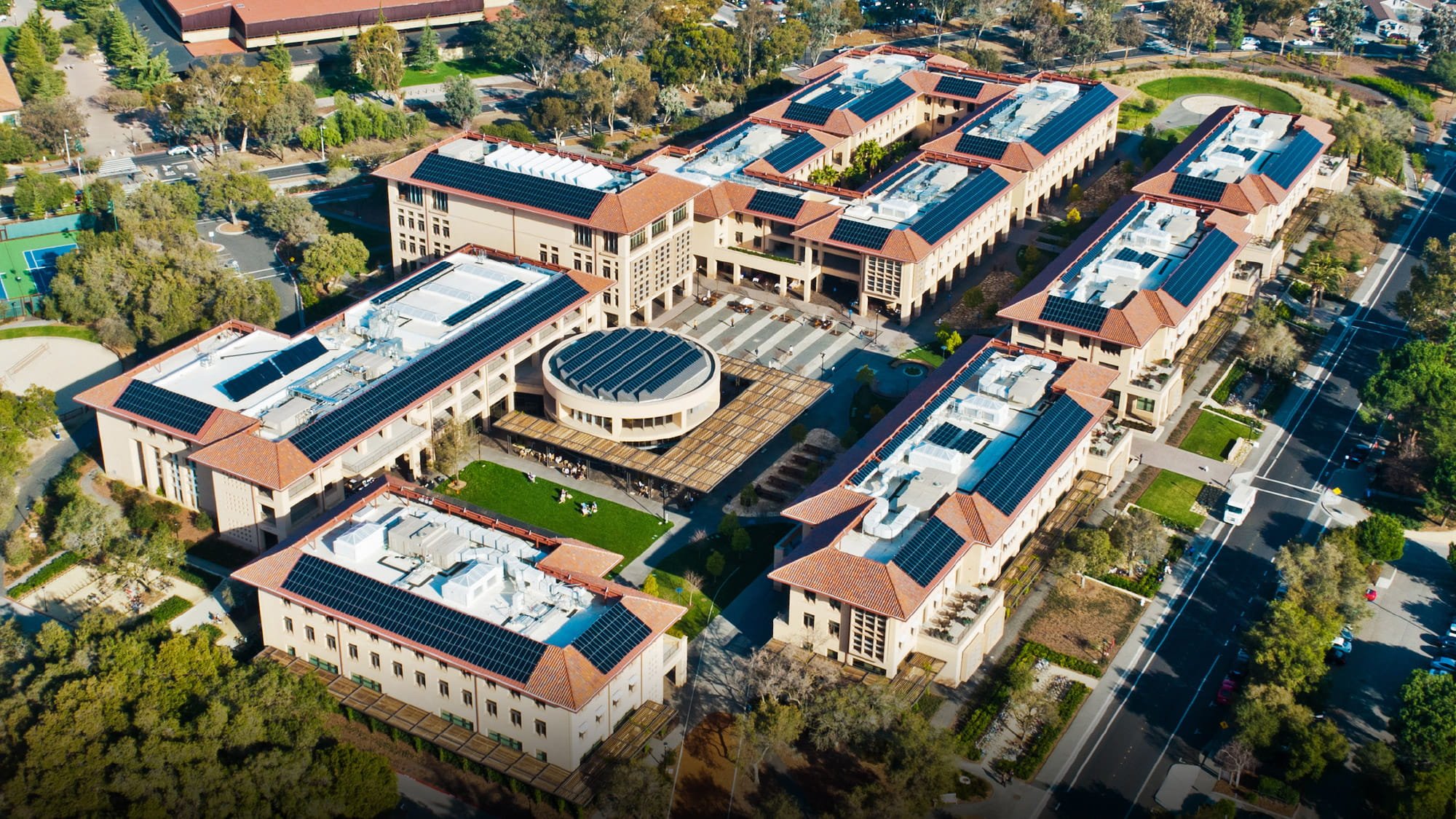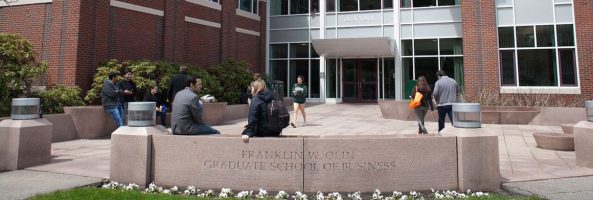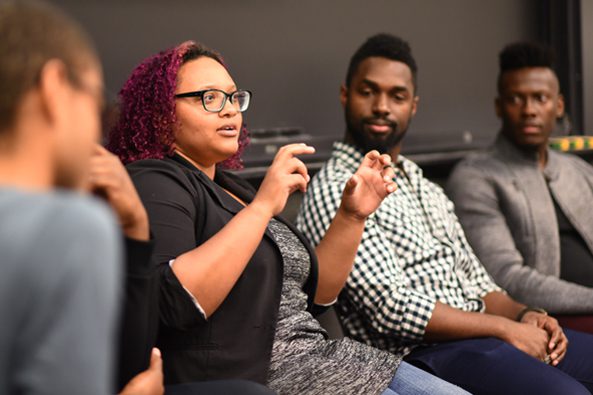Financial Times Ranks the Top MBAs for Entrepreneurs

Leading entrepreneurs in the business world today can often be seen as trailblazers, standing strong and independent in an often cutthroat world. What isn’t seen as often is the kind of support—whether financial capital or mentorships—that can help get an idea off the ground. In recent years, business schools and MBA programs around the globe have made this kind of support for new businesses a core part of their operation, often offering entrepreneurship majors, business pitch competitions, startup incubators and more.
Each year, The Financial Times releases their ranking of the best MBA programs for entrepreneurship, helping up-and-coming entrepreneurs to make informed choices about the best program for their career and startup goals. Its latest ranking, for 2018, has just been released.
The 2018 ranking of the top MBA’s for entrepreneurship compiled fifty schools from around the world. A number of factors went into determining which schools would make the grade, including the percentage of graduates who started a company after earning their degree, percentage of female entrepreneurs, the extend to which funding from the school or from the school’s alumni network helped in the creation of new businesses, and more. These factors combined would help decide in what position a school would fall on the ranking.
This year, schools in the United States took the top three spots on the list: the Stanford Graduate School of Business, the F.W. Olin Graduate School of Business at Babson College, and the Tuck School of Business at Dartmouth College. Two UK business schools—the Lancaster University Management School and the Cass Business School—rounded out the top five.

Despite dipping numbers of students, the Stanford Graduate School of Business entrepreneurship program is still the top-ranked in the world, according to the Financial Times.
At Stanford, although it still ranked as the best school for entrepreneurship globally, there was actually a significant drop since in the number of students starting a business within three years of graduation. This year, it was just 22 percent of students compared with last year’s 36 percent. Babson College’s Olin Graduate School of Business also witnessed a drop; from 52 percent last year to 37 percent in 2018.
One explanation for the drop, however, is not that interest in entrepreneurship is declining, but instead being taken on more as a ‘side hustle’ than a full-time career. This was certainly the case for Samantha Penabad, a former strategy manager at Accenture and MBA at Berkeley’s Haas School of Business, who has been working on a digital donation platform called GivingFund. Although she didn’t intend on becoming an entrepreneur when she started business school, tutors at the university helped her to develop a business plan and a fellow student with finance experience joined as a co-founder. The service is scheduled to launch later this month.
But GivingFund remains a side job for Penabad, who will be taking on a full-time job in strategy and operations at Google in New York after graduation. As a result, someone like Penabad will be not be included in data for students starting businesses after graduation, but among those accepting full-time jobs. Students pursuing similar paths—working full-time but starting businesses on the side—may help explain the dip in entrepreneurship that many MBA programs are witnessing.
One reason behind this trend may be the fact that many students see a full-time role as just one step to eventually starting their own company. By putting their skills to work at a top company like Amazon or Google, students are able to more quickly pay off their student loans, which means eventually starting a business debt free. Companies like Amazon also may seek out those with entrepreneurial experience, because it demonstrates an attractive leadership quality.
“We welcome applicants with an entrepreneurial spirit,” says Amazon’s senior manager of campus recruiting, Dee Clarke. “They are given the ownership over their work, like they would [in] their own business, but within a global support network that provides added guidance and support.”
Guthrie Jones, an MBA at London’s Cass Business School, holds a similar philosophy. Although he had no intention of getting into entrepreneurship, he couldn’t stop thinking about one particular business idea and decided he’d have to pursue it. Guthrie believes his company, Icepick, which lets people rent out space on their hard drives, has the potential to become a global business. Still, if he right opportunity for a salaried role came up after graduation, he would gladly shift his plan to the side.
Nevertheless, student interest in studying entrepreneurship as part of their MBA has grown at schools like Cass. Part of this may be the result of Cass’s £10m investment fund, which has not only supported new MBA start-ups but has also trained students in the process of investing.
Financial Times MBA Entrepreneur Ranking (2018)
- Stanford Graduate School of Business
- F.W. Olin Graduate School of Business (Babson)
- Tuck Business School (Dartmouth)
- Lancaster University Management School
- Cass Business School (City University)
- Otto Beisheim School of Management (WHU)
- IMD Business School
- Saïd Business School (Oxford)
- Harvard Business School
- Judge Business School (Cambridge)
What are the Best MBA Programs by Specialty?

Each year, U.S. News and World Report looks at the top business schools around the country to decide which offer the best MBA programs. The goal is to help MBA candidates most effectively choose the best MBA degree to help them achieve their goals based on their interests and strengths. The problem is that there are hundreds of programs and it can be difficult to weed out all the noise to get to the information that you want most.
That’s why the U.S. News and World Report decided to break down all of their findings into a more easily consumable ranking. They outlined the top MBA programs by discipline to help you quickly and easily find the school you’re looking for. Each of the schools on the list was chosen based on alumni interviews, schools statistics, research data, and more.
We’ve broken down the results below along with crucial information about each school listed and where you can learn more information.
MIT Examines the Appeal of Lying, and More – Boston News

Let’s explore some of the most interesting stories that have emerged from Boston business schools this week.
When the ‘Lying Demagogue’ is the Authentic Candidate – MIT Sloan Newsroom
One of the major questions in the post-Trump U.S. public discourse is how voters could possibly support a political figure that so brazenly bends the truth at every possible turn. In a new paper published in February’s American Sociological Review, MIT Sloan School of Management professor and deputy dean Ezra Zuckerman Sivan attempts to rationalize the appeal of a lying demagogue:
“When a candidate asserts an obvious untruth especially as part of a general attack on establishment norms, his anti-establishment listeners will pick up on his underlying message that the establishment is illegitimate and, therefore, that candidate will have an ‘authentic’ appeal despite the falsehoods and norm-breaking.”
Read more about Zuckerman Sivan’s research here.
What Most People Get Wrong About Men and Women – Harvard Business Review
The ongoing pay gap dialogue has inspired both men and women to step up and pressure the organizations that employ them to commit more aggressively to gender parity. In a recent Harvard Business Review article, HBS researchers Catherine H. Tinsley and Robin J. Ely explore the harmful rhetoric that drives many of these well-meaning initiatives and offer a four-step alternative approach for people to:
1) Question the narrative
2) Generate a plausible alternative explanation
3) Change the context and assess the results
4) Promote continual learning.
“The solution to women’s lagged advancement is not to fix women or their managers but to fix the conditions that undermine women and reinforce gender stereotypes. By taking an inquisitive, evidence-based approach to understanding behavior, companies can not only address gender disparities but also cultivate a learning orientation and a culture that gives all employees the opportunity to reach their full potential.”

“When people are less embedded, they are also less aware of opportunities for stretch assignments and promotions, and their supervisors may be in the dark about their ambitions. But when women fail to “lean in” and seek growth opportunities, it is easy to assume that they lack the confidence to do so—not that they lack pertinent information.” – Catherine H. Tinsley and Robin J. Ely
You can check out the full article here.
Unity in Diversity: The Babson Latin American Forum – Babson Blog
The Babson College F.W. Olin Graduate School of Business recently hosted its Latin American Forum, which featured esteemed guest speaker and Open English founder Andres Moreno, whose online platform teaches English, and Santa Teresa rum CEO Alberto Vollmer.
Moreno and Vollmer both used their lectures as an opportunity to examine how entrepreneurship can co-exist with social impact. Vollmer discussed the Alcatraz Rugby Project, a recognized program of social reintegration for young people with behavioral problems. Moreno chose to focus on how his delivers the best product and service to its consumers.
You read a more in-depth survey of the Babson Latin American Forum here.
Babson Entrepreneurship Stays at #1 for 25 Consecutive Years

For the 25th year in a row, U.S. News & World Report ranked Babson College’s F.W. Olin Graduate School of Business as the number one program for entrepreneurship in the United States. Entrepreneurship is an indelible part of the business school and MBA program, found within the curriculum, faculty, clubs, centers, and more.
Babson’s Entrepreneurship Curriculum
At Babson, the 50-plus faculty members and 30 adjunct entrepreneurs—the largest dedicated entrepreneurship faculty in the world—come together to teach Entrepreneurial Thought & Action®. This methodology is a way to balance action, experimentation, and creativity with business fundamentals. The goal is to empower students to take action on social, economic, and environmental issues to create value. Students are taught to apply ET&A™ in everything from large corporations to running a charity, solving social issues, and starting a business.
In addition, at Babson, there’s the idea that “we are all entrepreneurs,” which falls under the Entrepreneurship of All Kinds® heading. This concept re-imagines entrepreneurship to include all brilliant improvisers, not just startups, venture capital firms, and business incubators. It looks at how every organization can use entrepreneurship to creatively solve problems and adapt to change.
Both ET&ATM and Entrepreneurship of All Kinds® are interwoven into the very fabric of Babson, being taught in every classroom and every topic.
Babson’s Entrepreneurship Focus
Outside of the curriculum and academic philosophy of Babson, entrepreneurship can be found in dedicated centers and other resources. For example, the school is home to the Arthur M. Blank Center for Entrepreneurship, which helps to accelerate the practice of entrepreneurship through mentoring, competitions, events, workshops, and more. This Center is the hub of the entrepreneurial ecosystem.
There’s also the John E. and Alice L. Butler Launch Pad, which hosts two signature entrepreneurship events every year: the Rocket Pitch and B.E.T.A. Challenge both of which bring together students and alumni to compete in business innovation. The Launch Pad is also responsible for the Summer Venture Program, which accelerates the top 15 student ventures at Babson each year.
To gain more in-depth insight into Babson’s entrepreneurial focus, we had the opportunity to interview Keith Rollag, the Dean-Elect of the Graduate School (starting July 1). He was able to talk to us about how Babson has been able to stay as the number one program for entrepreneurship for 25 years as well as what that looks like at the university.
-
How has the Babson MBA managed to maintain the #1 entrepreneurial slot for so long?
There are several reasons; some of it comes from our first-mover advantage. We taught our first course in entrepreneurship in 1967, and created the Center for Entrepreneurial Studies in the 1970’s at a time when entrepreneurship wasn’t really accepted as a separate business discipline. We started the Babson Entrepreneurship Research Conference in 1981 (which continues to be one of the premier conferences for entrepreneurship) and the Price-Babson Symposium for Entrepreneurship Education in 1984, which over the years has taught almost 5000 educators from over 1000 institutions and 80-plus countries how to teach entrepreneurship.
But our #1 ranking is also due to the creation of a Babson community, culture, and curriculum that is built around entrepreneurship. Entrepreneurship has been an important part of our curriculum since the 1980’s, and we’ve built what we think is the largest entrepreneurship department in the world with over 50 full-time and adjunct faculty members.
Entrepreneurship has been a part of our Babson DNA for decades, and we live it as well as teach it. We are constantly updating our curricula, trying new things, building new partnerships, and exploring new opportunities. The term Entrepreneurial Thought and Action is the latest embodiment of this spirit, and it aptly implies the energy and enthusiasm that is an integral part of Babson.
-
Why do you feel that Entrepreneurial Thought & Action is vital to an MBA education?
At its core, Entrepreneurial Thought and Action is all about rapid learning, and in today’s dynamic world of uncertainty, whoever learns fastest wins. We teach our students to know when to learn quickly through analyzing, strategizing, and planning, and when to learn quickly through prototyping, experimenting, interacting with customers. Both are critical for success, but our education and reward systems tend to favor thinking and discussing over acting. We know from the habits of successful entrepreneurs that in times of high uncertainty, action (and the learning that comes from it) is the best way to solve problems and take advantage of emerging opportunities.
In our Babson MBA programs, we help students develop both a mindset and habit of learning through action. This is valuable whether you are trying to lead innovation within large corporations, grow and expand small and medium-size businesses, create new ventures, or simply find new ways to address complex-but-important problems facing communities, regions, and the world.
Learning quickly is a skill that will always be valued by organizations. While markets, technologies, structures, and roles may change, the need for a manager to learn quickly will never go away.
-
What aspect of your entrepreneurship studies/opportunities/focuses would you like to highlight?
We do many things under the broad heading of “entrepreneurship of all kinds.” Students have the opportunity to participate in intensity tracks around entrepreneurship (where they can build their venture while they are getting an MBA), women-led entrepreneurship, social innovation, and technology development. We also have the Butler Launch Pad as well as our highly competitive Summer Venture Program that helps start dozens of ventures (both business and social-focused). And our MBA students have several clubs focused on regional entrepreneurship and host well-attended conferences on United States, Asian, Indian, and Latin American entrepreneurship.
Whether one is considering starting a company or looking to lead ventures within larger organizations, or just wanting to maximize their impact on the world, an entrepreneurial, can-do, action-oriented mindset primes everyone for success.
Harvard Talks Analytics, MIT Explores Diversity in Tech, and More – Boston News

Let’s explore some of the most interesting stories that have emerged from Boston business schools this week.
Should an Algorithm Tell You Who to Promote? – Harvard Business Review
Professor of human resource management Jeffrey T. Polzar published a fictionalized case study that illuminates the influential role that “people analytics” algorithms play in steering hiring managers to which hot new talent. In a recent interview with Harvard Business Review, Polzar said:
“The day after Anne’s farewell party, Aliyah met with Christine and Brad Bibson, a data scientist on the people analytics team. ‘We’ve just started looking at networks,” Brad said, ‘and we think they can reveal some useful information. These are network analyses based on Molly’s and Ed’s e-mail and meeting history at BBI. With their permission and without looking at the content of their e-mails or calendars, we analyzed who they had been in contact with across the firm over the past six months.'”
Explore more of the fictionalized case study here.
Diversity in Tech a “People Problem” In Need of a Management Solution – MIT Sloan Newsroom
The MIT Sloan Coders Club recently hosted the Black in Tech and Entrepreneurship panel, in which a group of five entrepreneurs and engineers “shared experiences and offered suggestions on what tech companies can do to diversify their workforces and diminish bias.” Adam Taylor, founder of news app Black, explains:
“It is a people problem. When you think about the people that are on your teams professionally, how would you hire someone to work with you every day for however long they’re with your company? You tend to hire people you’re comfortable with.”

Students Roderic Morris of Drift, Amal Hussein, Nana Essilfie-Conduah, and Adam Taylor / Photo via Mimi Phan
Read more about this diverse take on tech’s diversity issue here.
AI Knows What Customers Want, Transforms Supply Chains – D’Amore-McKim Blog
D’Amore-McKim’s distinguished professor of supply chain management Nada Sanders uses Spanish “fast fashion” company Zara as the shining example of an optimized supply chain that uses artificial intelligence to drive customer satisfaction. In fact, many other businesses have begun to crib notes.
“Seven-Eleven Japan has taken lessons from Zara, using technology to microsegment demand and to understand what customers want. They will literally reshuffle and change what the merchandising looks like in the course of one day, in one location, for different segments of customers.”
Read more about professor Sanders’ research here.
Babson Reveals New Scholarships, Rankings, for Blended Learning MBA – MetroMBA
MetroMBA recently spoke with F.W. Olin Graduate School of Business faculty director Phillip Kim about the shape of the Babson Blended Learning hybrid online MBA program, shortly after the school earned some high praise from the likes of the Financial Times.
“Our program integrates the best of the ‘full-time’ graduate experience with a delivery format designed for working professionals, whose time is at a premium. Our students can complete their MBA in 21 months while working full-time. They learn from accomplished faculty, who are experts in their own disciplines and translate academic concepts into practical takeaways for our students. We are also the number one school for entrepreneurship education, and this ethos is infused throughout the program.”
Read more of our interview with Kim here.
Philadelphia or Boston? Where’s the Best Place to Earn a Part-Time MBA

If you are interested in pursuing a degree in a diverse East Coast city, want to be surrounded by history and culture, and still immerse yourself in growing business community, two main cities come to mind: Philadelphia and Boston.
Both cities are at the center of U.S. history, and continue to be some of its largest centers of commerce and academia, with numerous opportunities to put its stellar education to work.
Surrounded by so many possibilities for professional development, an MBA student in a city like Philadelphia or Boston may not want to put their career and income on hold to pursue a full-time degree.
Thankfully, many of the business schools in Philadelphia and Boston offer part-time MBA programs, allowing students more flexibility as they kick off their careers in these exciting cities. But how to decide which one? We’ll take a look at some of the top part-time MBA programs in each metro to help you choose the right city for you.
Location
Once the capital of the United States, Philadelphia has never stopped being a center of both business and history since the time it played host to the country’s founding fathers. Home to some of the oldest and best universities in the country, Philadelphia has experienced a renaissance in recent years as young talent has become priced out of more expensive metros like New York City and Washington DC. The cost of living in Philadelphia remains fairly low, while the ever-growing business scene in the city offers the opportunity for high earning potential. This year, 14 Philadelphia-area companies made the Fortune 500 list.
Like Philadelphia, Boston has been a center of commerce and trade since the days of the Boston Tea Party. Today, the city is home to nine Fortune 500 companies, including major established firms like GE (13th on the Fortune 500 list) and newer but thriving businesses like Wayfair. However, Boston has a much higher cost of living than Philadelphia. The city currently ranks as the third most expensive city in the country.
Programs
Between the Wharton School of Business and the Harvard Business School, Philadelphia and Boston offer two of the most highly regarded MBA programs in the country. However, both of these schools only offer full-time MBA programs. Students looking for more flexibility in their schedules still have a number of stellar programs to choose from.
Most of the part-time MBA programs in the Philadelphia metro work on a hybrid structure, allowing students to take a combination of classes both online and in person. Many programs also offer students the chance to select majors or concentrations in which to specialize their business education. With a variety of possible concentrations at some of the most highly-ranked part-time programs in the country, students from these programs have gone on to find employment at major firms like DuPont, KPMG, and JPMorgan Chase.
Part-Time MBA Programs in Philadelphia Include
- Lehigh University College of Business and Economics
- Fox School of Business – Temple University
- La Salle University
- LeBow College of Business – Drexel University
- Lerner College – University of Delaware
- Rohrer College of Business – Rowan University
- Rutgers School of Business, Camden
- Villanova School of Business
- West Chester University
Like Philadelphia, Boston’s part-time MBA programs offer more flexibility for students to complete their degree on their own time. Most courses are offered in the evening or on weekends, and can be taken over the course of just two years or up to seven. Programs like the MBA at D’Amore-McKim also give students the opportunity to concentrate in fields such as Corporate Finance, Corporate Renewal, Entrepreneurship, and more.
Part-Time MBA Programs in Boston Include
- Carroll School of Management – Boston College
- D’Amore-McKim School of Business – Northeastern University
- F.W. Olin Graduate School of Business – Babson College
- Questrom School of Business – Boston University
- Sawyer Business School – Suffolk University
- Simmons School of Management
Cost
The tuition costs can vary from program to program, and can also be cheaper if the part-time program is competed online. On average, programs in the Philadelphia metro area can range from $45,000-$65,000 for the degree. The range of costs in Boston can be slightly higher, with some students spending up to $95,000 over the course of their degree.
Jobs
Although the cost of an MBA in Boston may be slightly higher than Philadelphia, the difference in average salary between the two cities may even out concerns of cost. In Boston, the average salary for someone with an MBA degree in a field like finance is $112,000, whereas in Philadelphia it is only around $90,000 per year.
